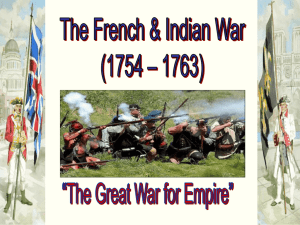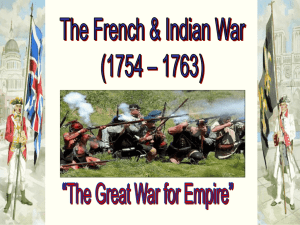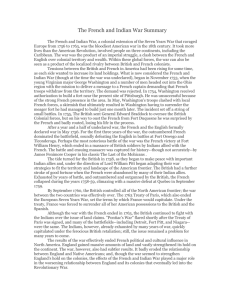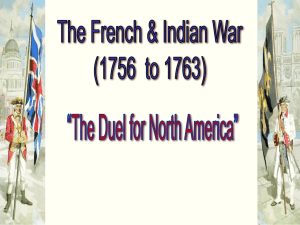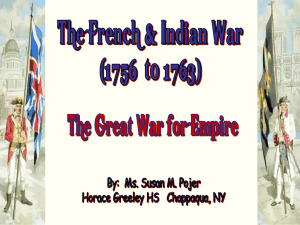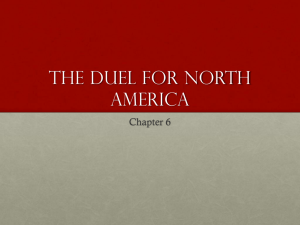The French-Indian War
advertisement
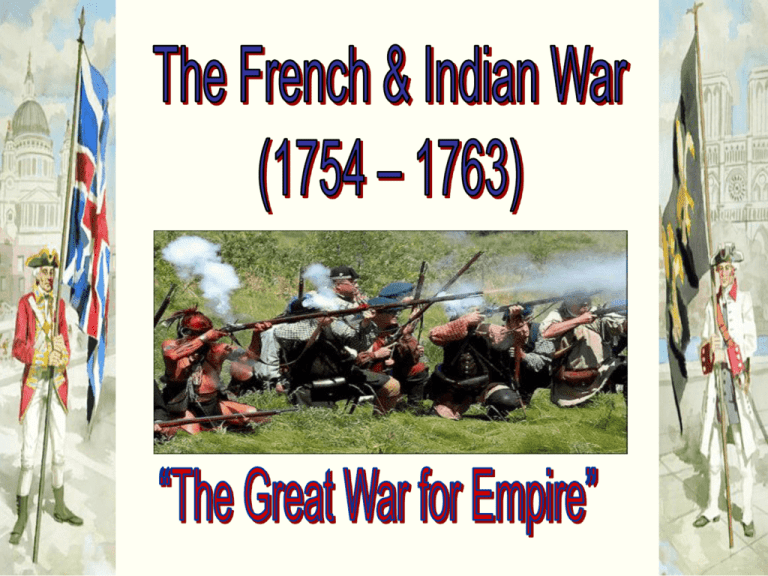
North America in 1750 CAUSES OF WAR • Continuous rivalry between British and French over North American empires – King William’s War, War of Jenkins Ear, King George’s War • Conflicting claims over Ohio River Valley – England? • fur trade/expansion – France? • fur trade/link b/w Canada & MS Valley Beaver fur has multiple layers of different types of hair. CAUSES….. • France’s Fort Duquesne – Threatened colonial safety – A barrier to further British expansion westward 1753 Major Washington • VA Gov. Dinwiddie learns FR troops moved into Ohio River Valley & building forts • Major Washington, 21, sent by Gov. to deliver message to FR to get out – FR interpreter with him • Return trip to VA is brutal – Winter, horses dying, so hike through snow – Indian who offered to show them a hortcut and then shot at him (poor aim!) – Pursued by Hurons (FR allies) – Falls off raft into ice-choked Allegheny River – Spends freezing night on island, guide suffers frostbite but GWash unhurt • Gov. publishes account of Washington’s arduous 900 mi. journey in both Williamsburg & London – Washington gains international reputation by age 22…. » - THE LEGEND BEGINS! 1754 The Spark British The Ohio Valley CONFLICT BEGINS AT FORT DUQUESNE Will spark global war! French Ft. Duquesne, #1 • Colonel GW & 150 VA militia dispatched by Gov. Dinwiddie • Skirmish w/FR & kill 10, including their commander – BIG MISTAKE militarily – “I heard the bullets whistle, and believe me, there is something charming in the sound.” George Washington • GW retreats to makeshift fort, Ft. Necessity…what happens there? • Forced to surrender when surrounded by FR (on July 4th) – GW humiliated,,,, resigns, but will later return • Sparks global war! Reconstructed model of the hastily built Fort Necessity. Depiction of George Washington at age 22. A young George Washington surrenders to the French. 1754 Albany Plan of Union Meeting called by BR for purpose of keeping Iroquois loyal to them – Covenant Chain Franklin proposes a “Plan of Union” to achieve greater colonial unity and provide for better defense against FR Would provide for one colonial assembly to manage trade, Indian policy & defense Representatives from only 7 colonies come; plan rejected by colonies & London So, Albany Congress failed BUT... a first attempt at colonial cooperation by Benjamin Franklin - Cartoon in the Pennsylvania Gazette, May 9, 1754 1755 Ft. Duquesne #2 • British Gen. Edward Braddock • George Washington & Daniel Boone • Attack Fort Duquesne and are severely defeated – why? 1500 French and Indian forces – over 900 of 1100 BR, including Braddock, killed • GW becomes legend! • 4 bullets pierced coat, 2 horses shot from under him, Indian belief… BR then fail in Canada… too many small attacks; no concentrated effort on Quebec… • 1756 War Is Formally Declared! Lord Loudoun Marquis de Montcalm Native American tribes exploited both sides! A global war is in effect: “The Great War for Empire” British-American Colonial Tensions Colonials Methods of Fighting: • Indian-style guerilla tactics. Military • Col. militias served Organization: under own captains. British • March in formation or bayonet charge. • Br. officers wanted to take charge of colonials. Military Discipline: • No mil. deference or protocols observed. • Drills & tough discipline. Finances: • Resistance to rising taxes. • Colonists should pay for their own defense. Demeanor: • Casual, non-professionals. • Prima Donna BR officers with servants & tea settings. 20,000 colonials serve – myth of BR invincibility shattered. 1757 William Pitt Becomes Foreign Minister He understood colonial concerns & offered them a compromise: For colonial loyalty & mil. cooperationBritish would reimburse colonies for much of their troops/supplies. RESULTS? Colonial morale up by 1758 TURNING POINT IN WAR!! Puts younger BR officers in place; “The enemy of my enemy…..” Aids FR’s enemies elsewhere around world & thus forces FR to withdraw some troops from AM Battle at Ft. William Henry “Last of the Mohicans” • Lake George, NY • BR Col. Munro vs. FR Montcalm • BR, unable to get reinforcements, surrender the fort Aug. 1757 • FR Indian allies massacre BR on their exit from the fort 1758-1761 The Tide Turns for England 1758 – First major BR victory: LOUISBURG, the gateway to New France, St. Lawrence River * By 1761, SP has become an ally of FR Battle of Quebec - 1759 •James Wolfe vs. Montcalm •BR couldn’t get Quebec because … •Wolfe comes up with a new plan…. Battle of Quebec - 1759 •The End for France! •Montcalm & Wolfe both die •Montreal then taken in 1760 1763 Treaty of Paris France --> lost all Canadian possessions, most of her empire in India, and claims to lands east of the Mississippi River; only keeps W Indies sugar islands - Haiti Spain --> got all lands west of the Mississippi River & New Orleans from FR; but cedes Florida to England in exchange for Cuba. England --> got all French lands in Canada, exclusive rights to Caribbean slave trade, and commercial dominance in India; owns all lands east of MS River North America in 1763 North America in 1763 North America in 1750 Effects of the War on Britain? 1. It increased her colonial empire in the Americas. 2. It greatly enlarged England’s debt – heavy taxation of the colonies begins! 3. Britain’s contempt for the colonials created bitter feelings. Effects of the War on the American Colonials 1. It united them against a common enemy for the 1st time! 2. It created bitter feelings towards the British that would only intensify. 3. Military experience for officers & men. 4. Shattered myth of BR invincibility! 5. Encourages colonial expansion. 6. Hostility towards Native Americans. The Aftermath: Tensions Along the Frontier 1763 Pontiac’s Rebellion Fort Detroit • Ottawa Chief / FR Indian allies attack BR & AM • Destroy 3 BR outposts / kill 2,000 colonists in PA, MD, VA • Biological warfare used by BR in Detroit – Distribute “gifts” of smallpox-infected blankets to Indians. Pontiac’s Rebellion (1763) RESULT? BR realize need to stabilize Indian relations & keep troops stationed along the frontier. Colonists see Pontiac’s defeat as free ticket to populate the OH Valley. BACKLASH! British Proclamation Line of 1763. Goal of the BR? Reaction of Colonials? General Colonial Reaction to Proclamation of 1763 • Colonists see it as an attack on their liberty, an attempt to control them • Ignore it and continued to move West • DANIEL BOONE helped lead the way! Deeper Unrest: The Paxton Boys & The Regulators • The PA frontier area populated by many roughand-tumble Scots-Irish immigrants - weary of the colonial assembly’s inattention to Indian attacks and requests for soldiers, guns, powder and lead. Many in the assembly were pacifist Quakers. • A group of Paxton men took matters into their own hands in Dec. 1763 - raided a small settlement of peaceful, co-existing Conestoga Indians in Lancaster County, PA. 6 Indians killed in the attack & 14 taken captive; all later murdered. • PA Gov. issued warrants for arrest, but sympathetic frontiersmen refused to assist in bringing the Paxton Boys to justice. • Paxton Boys later marched on Philly in 1764 to protest the Quakers’ lenient Indian policies. • Franklin himself negotiated resolution • Similar “Regulator Movement” in Carolinas. – Regulators were backcountry farmers. – Called for more courts on frontier, fairer taxation, and greater representation in colonial assemblies. Collaboration of Susan Pojer and Pamela Montague
